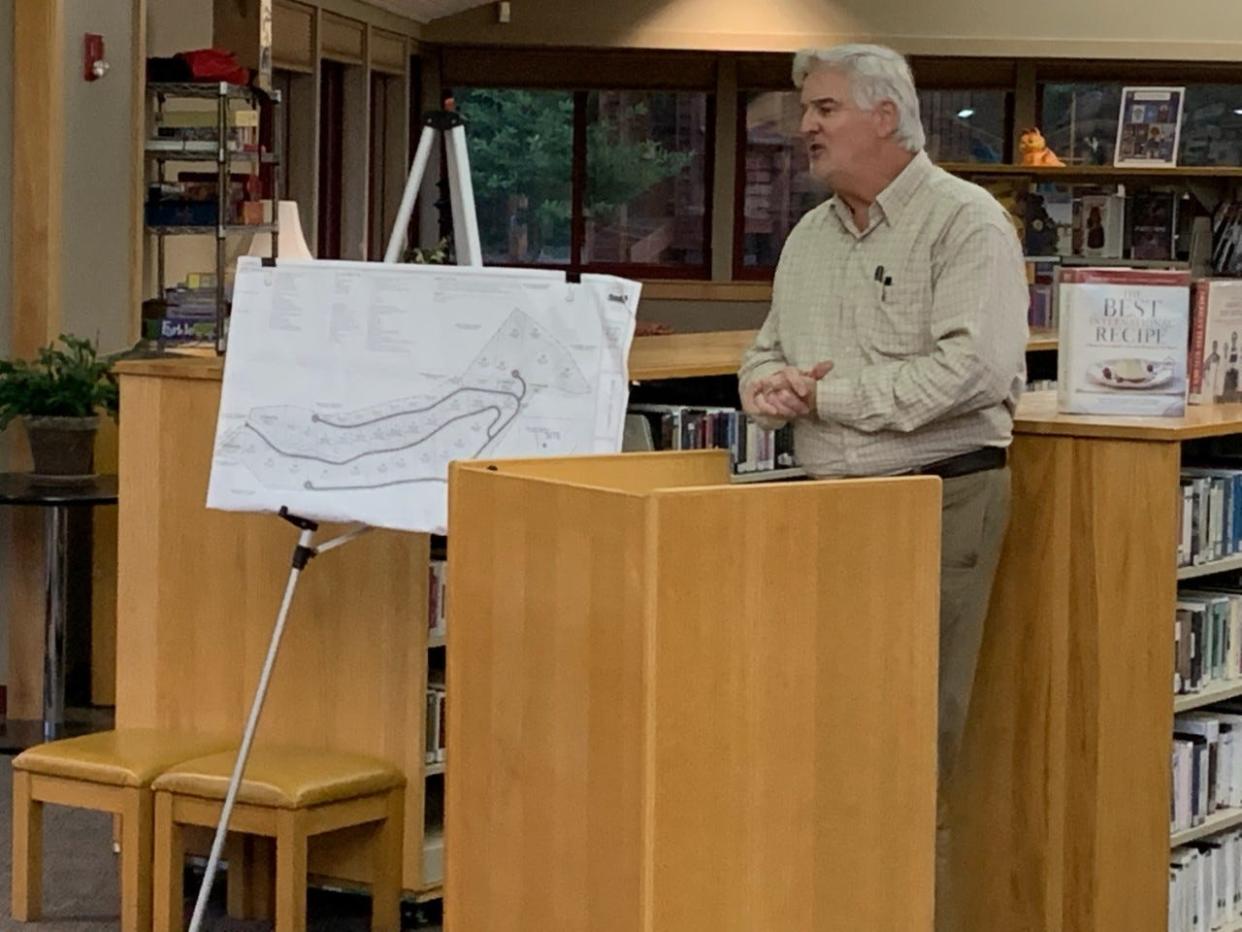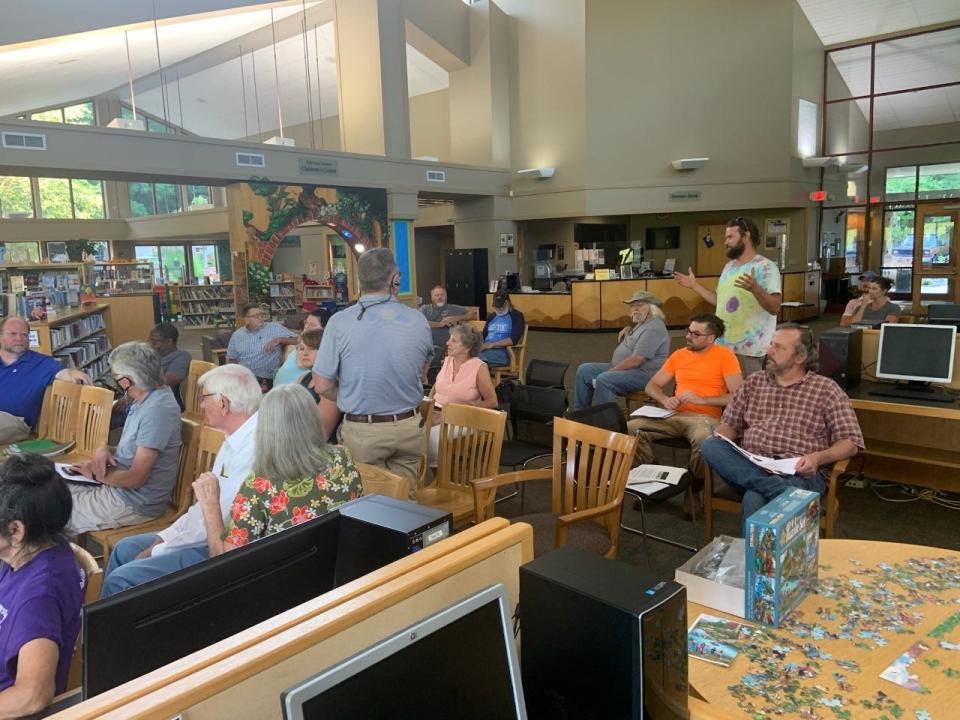Planning Board tables vote on proposed changes to ordinance relating to biomass facilities

MARSHALL - The county planning board wants to read up on biomass facilities before it votes on whether to approve adding language about these potentially environmentally hazardous facilities to the Land Use Ordinance.
In its Aug. 2 meeting, which was continued from July 19, the Madison County Planning Board voted unanimously to table a vote on adding language relating to biomass facilities to its Land Use Ordinance, which currently makes no mention of such facilities.
Board member Alan Wyatt asked Planning and Zoning Director Terrey Dolan and Development Services Director Brad Guth what specifically prompted the proposed language additions, and Guth said an unnamed power company reached out to him about potentially bringing business to Madison.
"I had an inquiry about a biomass facility," Guth said. "I don't have a lot of specifics about it. Just like any economic development project, they had a third party working for them. We don't have anything on the books to regulate a biomass facility. So, if they applied, we would basically have to deal with that during the application process. I felt in talking with Terrey that we needed to have something on the books to address biomass - whether it be the big industrial-type facility, or if it was a smaller thing.
"Our ordinance is mute on biomass. There are other things it's mute on, but we haven't had any inquiries about those at this moment."
The board will vote on the proposed ordinance changes in its next meeting, Aug. 16 at the Marshall library.
"We felt there was a need to put a dedicated segment into the Land Use Ordinance, just like there is for sawmills, and just like there is for solar power," Dolan said. "All it is right now is a draft section that would be embedded into the Land Use Ordinance. I would recommend that we come up with something in terms of biomass, because just ignoring it is not going to make it go away. That's my professional opinion. We need to address it in some form or fashion."
County land use attorney John Noor said if the board were to approve these additions, it could potentially provide clearer guidelines in the board's votes on whether to issue special use permits to developers.
"If you don't have a definition, what the zoning administrator's required to do if someone were to come in with an application is to find the most similar use, and apply those rules. That can be dangerous," Noor said. "For example, if the most similar use is something that's not that similar but it's the most similar, it might automatically be allowed, versus having to go through a special use permit.
"So, them bringing this to you all is saying, 'Let's be proactive. Let's think about what this would be,' and you all put in some baseline rules to begin with, so that we're not playing catch-up the first time we get an application submitted. There's a lot of conversation you all can have on everything from the definition of a biomass facility, to what it would have to provide in the application, to what are the requirements it would have to meet to get the permit approved."
Dolan said the board could stipulate that applicants would need to meet certain federal and state guidelines prior to going before the board for a special use permit.

Residents' opinions
Roughly 10 residents appeared before the board to offer public comments, including Marshall resident Elaine Robbins, who advocated for the board to add language requiring state and federal permitting.
"I like the idea of requiring them to get their EPA and DEQ permits in hand first," Robbins said. "That'll give us a lot of information."
Louis Zeller previously served as the executive director of the Blue Ridge Environmental Defense League.
"Biomass is part of the problem, not part of the solution," Zeller said. "Biomass combustion is combustion of organic matter. Substituting wood for coal does not reduce carbon emissions. If I was a planning board member, my hair would be on fire - if I had any left - about doing something to prevent what's happening in Kentucky, or what's happening in California, from happening here in North Carolina."
Derb Carter is a senior adviser and attorney for the Southern Environmental Law Center.
"'Biomass' is a broad category of energy producing material that basically organic matter, usually from dedicated agricultural crops, or in this case wood pellets, are being burned to create some heat and electricity," Carter said in an article that appeared in the July 27 edition of The News Record. "'Biomass' broadly refers to material that is organic or derived from plant material that is used to produce energy, at least in energy production."
In the state Department of Environmental Quality's Clean Energy Plan released October 2019, the DEQ dismisses forest derived biomass as a clean energy source, and further states the carbon and climate assumptions underlying the use of wood biomass that has led to pellet mills in N.C. for export should be challenged.
"Currently, the wood pellet industry does not contribute to NC’s energy generation portfolio and does not advance NC’s clean energy economy," the 2019 Clean Energy Plan said. "There are currently no known plans for the industry to become a contributor to N.C.’s energy sector in the coming years."
Marshall resident and local environmental advocacy organization Clear Sky Madison founder Jim Tibbetts outlined why he felt apprehensive about the potential for the county to host a biomass facility.
"Until we get clearer rules in place, we're an easy target for predator industries that are coming in, global industries that have plants all over the world, to come in and decimate our forests, as they have in the Southeast already."
Tony Ponder, of Mars Hill, said he supported making the changes to the ordinance but added that the county would need to add provisions.
"Basically, I agree that we need industry in Madison County," Ponder said. "But we need to know what we're getting into, because there are different types of biomass that create different products. First of all, I think you probably will have to consider zoning before anybody will consider putting a biomass plant in the county.
"In my opinion, biomass is a fly of the night thing. It's not going to last. There are other ways to create energy besides biomass."
Madison County's first zoning map in its Land Use Ordinance was adopted in 1974, making it the first county to adopt zoning districts, according to Noor.
According to Dolan, the proposed changes would allow for biomass facilities to be zoned in the Residential/Agricultural and Industrial districts. The planning and zoning director said only about 100 acres of the county's lands are Industrial zoned, while 96% of the county's lands are zoned Residential/Agricultural.
Ken Keshuba owns Mountainside Cabins in Hot Springs.
Keshuba said he believed the board members who drafted this original zoning map in 1974 were intentional in delineating such a limited Industrial district.
"Less than 200 total acres are zoned Industrial, and I take it that was done on purpose a long time ago," Keshuba said. "Keeping this county more residential and agricultural was a vision. If you look at this county compared to a lot of places in this nation, there is nothing here, and it's wonderful that way.
"Thank you for doing your due diligence to put the information together to define what it is and put regulations to it. But honestly, (Section) 8.3 should just say, 'No biomass facilities.'"
Board members', county planners' opinions
The board members, including Chair Jered Silver, said they'd like to have more time to read up on the proposed changes, and to do their research on biomass facilities.
"I think we should revisit it on (Aug.) 16th, and then think about what to do from there," Silver said.
Noor emphasized that there was no timeline on the board implementing the changes to the ordinance.
"You can decide in two weeks, or you can decide in two months," Noor said. "You can ask for additional information. You can solicit additional input from different experts, or have staff to look into that for you."
Another option, according to Noor, would be for the board to enstate a moratorium on taking applications from biomass facilities, similar to the six-month moratorium currently in place for commercial assembly hall venues, such as hotels, motels and event venues.
Additionally, Noor said the board could choose to institute conditional zoning, which would ban a biomass facility developer from being permitted in the county unless getting approval from the county commissioners in a site-specific proposal.
"There are almost an infinite number of possibilities to assemble," Noor said. "You've just got to decide how you want to do that, and what process you want to use to come to that."
Dolan urged residents to send him information relating to biomass, and said he wanted to hear residents' opinions on bringing a facility to Madison County.
"I'm trying to get educated myself on this," Dolan said.
The Madison County Planning Board will meet Aug. 16 at 6:30 p.m. at the Madison County Public Library's Marshall branch, located at 1335 North Main St. in Marshall.
This article originally appeared on Asheville Citizen Times: Planning Board tables vote on proposed biomass changes to Ordinance

